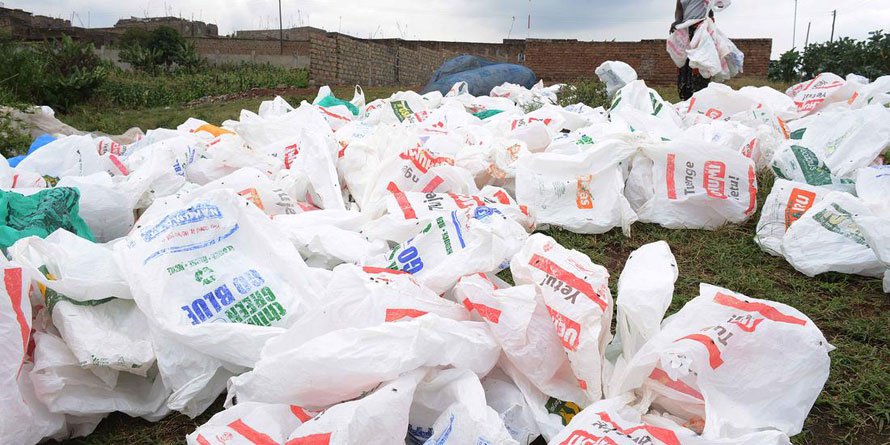As confusion reigns in the government over plans to ban plastic water bottles, it is emerging that nylon carrier bags are making a comeback in most parts of the country, five months after they were outlawed, reports the Daily Nation.
In Nairobi, sugarcane hawkers and a number of fruit vendors are openly using the banned wrapping materials even as the government says it will also ban plastic straws.
“Our goal is to ensure we reduce the use of plastic in Kenya as they are a major source of pollution,” said Environment PS Charles Sunkuli last week.
He appeared to acknowledge continuing use of plastic when he said the ban was 80 per cent effective, adding that the ministry is looking into claims of the materials finding their way into Kenya from neighbouring nations.
It is, however, emerging that plastic bags are imported into the country from Uganda and other countries that have unsuccessfully tried to take the same route, through porous border points. They are supplied to specific loyal customers by organised cartels.
The cabals are said to enjoy the protection of corrupt government officials. “Plastic carriers are imported alongside biodegradable ones and second-hand clothes and are supplied to clients at odd hours,” said a trader in Eldoret who requested not to be named for fear of reprisals.
Apart from Uganda, Tanzania and Burundi are other East African countries that have not banned the use of plastic bags. Only Rwanda and Kenya have enforced a ban on plastic bags.
In Kenya, the bags were popular among vegetable and snack dealers, breeders of tree seedlings and traders in small items. But the materials were a source of environmental pollution.
A number of unregulated firms in residential areas are supplying plastic bags on demand to small scale traders.
A spot check by Sunday Nation at Eldoret’s main market indicated that dealers have secret arrangements with suppliers who deliver the bags at designated points.
“Some of these plastic bags are old stock. The dealers are making frantic efforts to dispose them to avert losses,” said another trader at the market.
Nylon bags are also in circulation in major towns in Western Kenya and Rift Valley. Last week, 20 people were charged in a Narok court with using plastic bags. They were freed on a Sh100,000 bond each after denying the accusations.
This comes even as the National Environment Management Authority (Nema) and other related agencies launch a crackdown on individuals behind illegal and secret importation of banned nylon papers.
“We have sealed off areas where the products are sneaked into the country,” said Mr John Chumo, secretary of the National Environment Complains Committee.
He said the task force which receives complaints on environmental pollution is aware of illegal importation of banned plastic bags through the Kenya-Uganda border.
He said Nema and county governments should enforce the ban.
“We do not want to go back to outlawed plastic carriers. Nema will take drastic measures against individuals who flout the ban,” said Mr Chumo.
The Ministry of Environment announced a fine of Sh50,000 for anyone found with plastic shopping bags while manufactures flouting the rule will be fined between Sh2 million and Sh4 million.
According to Nema chief enforcement officer Robert Orina, some underground traders were still importing the bags. Boda boda operators are mainly used to circulate the products to customers in urban areas.
“We have information that plastic bags are still in circulation. But we will keep vigilance and ensure that this comes to an end,” said Mr Orina.
The majority of traders and livestock farmers have supported the ban on plastic carriers, noting that it has environmental benefits.
“Plastic bags posed health and environmental hazards. The ban has proved beneficial,” said Mr James Too from Saos, Nandi County.
The Kenya Forest Service and the Kenya Forestry Research Institute have developed alternative decomposable materials. “There should be no fear of loss of revenue or employment since we already have substitutes to plastic bags,” said Mr Chumo.
The ban on plastic bags has been a blessing in disguise for many entrepreneurs who have invested in eco-friendly bags from biodegradable materials.
While some manufacturers and traders are yet to come to terms with the ban, a couple in Turkana has seen a sharp rise in the number of orders for their recyclable bags.
“We are receiving many orders from cereal and fruit vendors who are switching from plastic to biodegradable bags,” said Ms Mary Erakai, from Kerio in Turkana Central sub-county.
She and her husband Eloto Ekwee pooled their resources and invested in the small business, selling their bags in Lodwar, Kitale and Eldoret. A bag made of palm leaves costs Sh100-Sh300.
“We generate a net profit of Sh20,000 monthly from the business, which has enabled us to take our children to school and afford decent meals,” said Mrs Erakai.
A survey by Sunday Nation indicates that the ban on plastic bags has pushed up the cost of essential commodities, including cereals and vegetables, to meet the higher prices of eco-friendly bags.
“We have no alternative but to transfer the cost of the bags to consumers, which has resulted in an increase in the price of some commodities,” said Mr Wilson Maina, a trader at Eldoret retail market.
The study revealed that most recyclable bags cost an average of Sh50. Most of these bags can be reused.





